Electric Conversions Are Saving Classic Cars
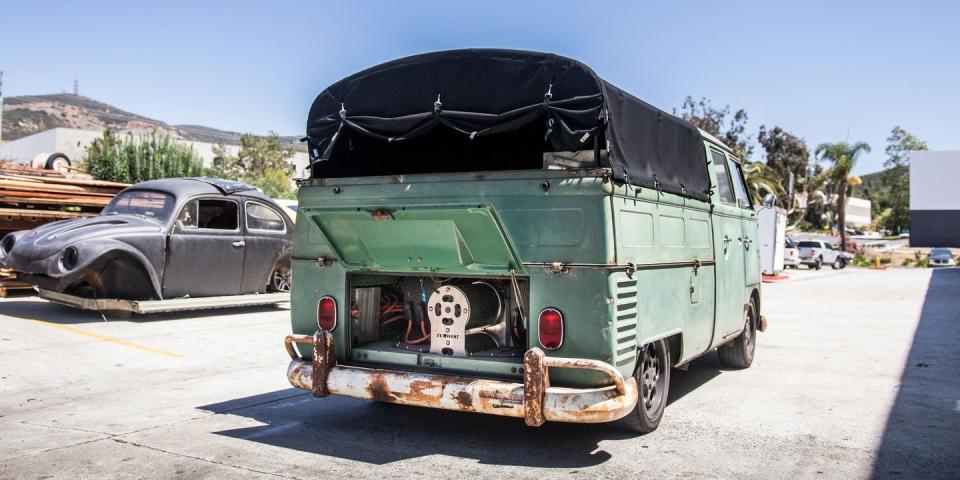
“What's the range?” is the wrong question. Little Deuce Coupe doesn't have a line about hypermiling. Nobody ever walked up to an LS-swapped 240SX and asked how much fuel it could hold in the gas tank. Is it fast? Does it corner hard? Can you rip off an epic burnout? These are much better questions, and at a shop in California that swaps Tesla power into lightweight classics, the answer is a joyful, “Hell, yes.”
Electric conversions have been around for decades, ever since the first Birkenstock-wearing grumps loaded up the bed of their Chevy S10 with lead-acid batteries, and flipped the bird to OPEC. Perhaps this image is your first assumption, that the idea of changing a car's powertrain from gasoline to electric is all about saving the environment at the expense of originality, character, practicality, and fun.
“F*** the environment,” said Mike Bream, president of EV West, “Save the cars! Oh wait, we also saved the environment? That's good too–but it's all about having your priorities straight.”
EV West is based in an office complex north of San Diego, spreading out over four bays. Everything you'd expect to find in a speed shop is here: the dog, the race car, the employee wrenching on his own project. It's just that everything runs on batteries. Well, not the dog.
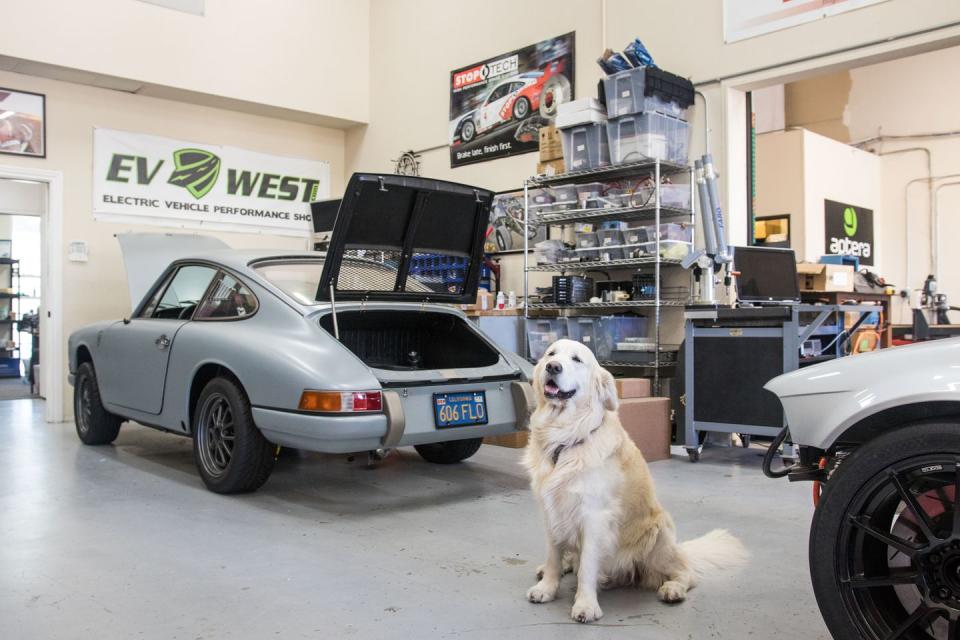
The racing machine is possibly why EV West might be ringing a a bell for you. A thousand-horsepower 1995 E36 M3 built to take on the Pikes Peak hillclimb, it took a class record in 2012, running up the hill in under twelve minutes with Bream at the wheel. It took four years for a gutted Tesla P90D with a modified battery pack to go quicker, an eternity in a field where energy density and power seems to change as quickly as computer processing speed.
Having sat for years, the M3 was pulled out of storage for little other reason than to lay a couple of 200ft rubber elevens out back of the shop one evening. There wasn't much prep work needed other than charging it up; compare this to the high-strung nature of your average internal combustion racing machine, and you'll see one facet of the appeal to the electric-swapped classics that are the bulk of EV West's current business.
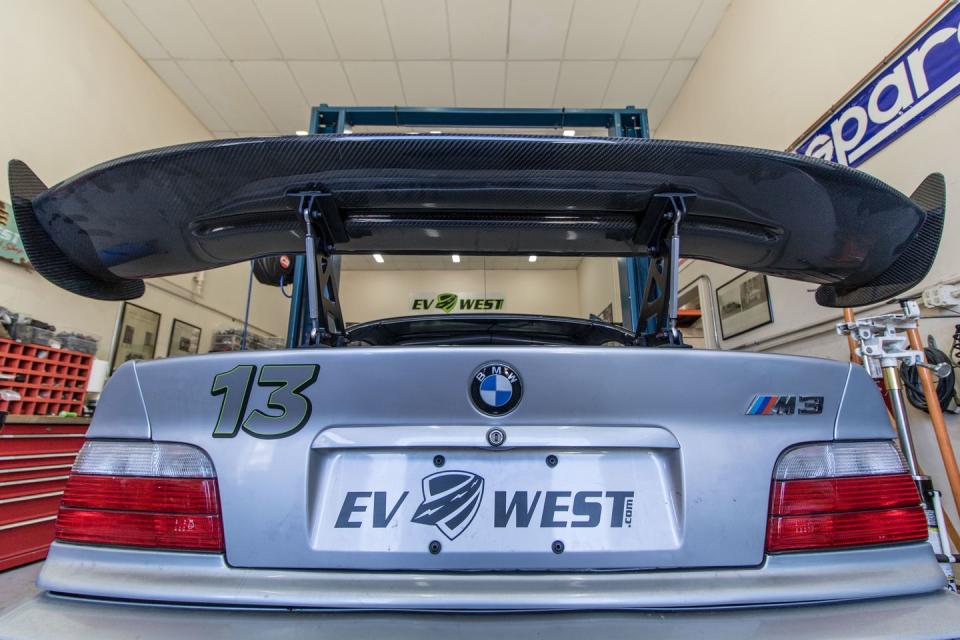
Electric works, when you want it to work. Bream hops into a beautifully restored 356 Speedster, and we head out for a couple laps of the neighborhood. If you must know, this particular build spec has a range of around 150 miles, more than enough for a morning spent mooching around town after hitting up your local cars and coffee.
To some, this car is beautiful sacrilege. Part of the delight of an old air-cooled Porsche is the rat-a-tat soundtrack, the smell of the exhaust, and the Swiss watch mechanical feel. This is a bit like replacing the guts of a manual-wind Omega Speedmaster with quartz.
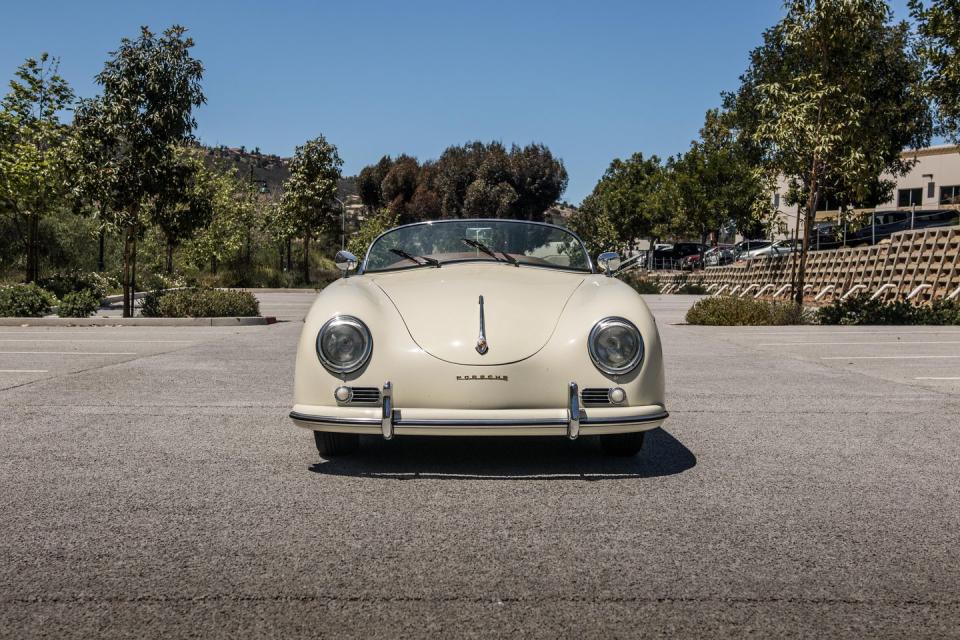
That's the perspective from the outside. From behind the wheel, EV West's builds preserve all the other elements of classic motoring–wind noise, unfiltered steering, a delicate lightness–and simply make it capable of handling regular traffic. The cars are improved in every metric, acceleration, braking, road-holding, and handling.
“With an old car, getting beat off the line by a Prius is embarrassing,” Bream said. “The only thing more embarrassing is being seen driving a Prius.”
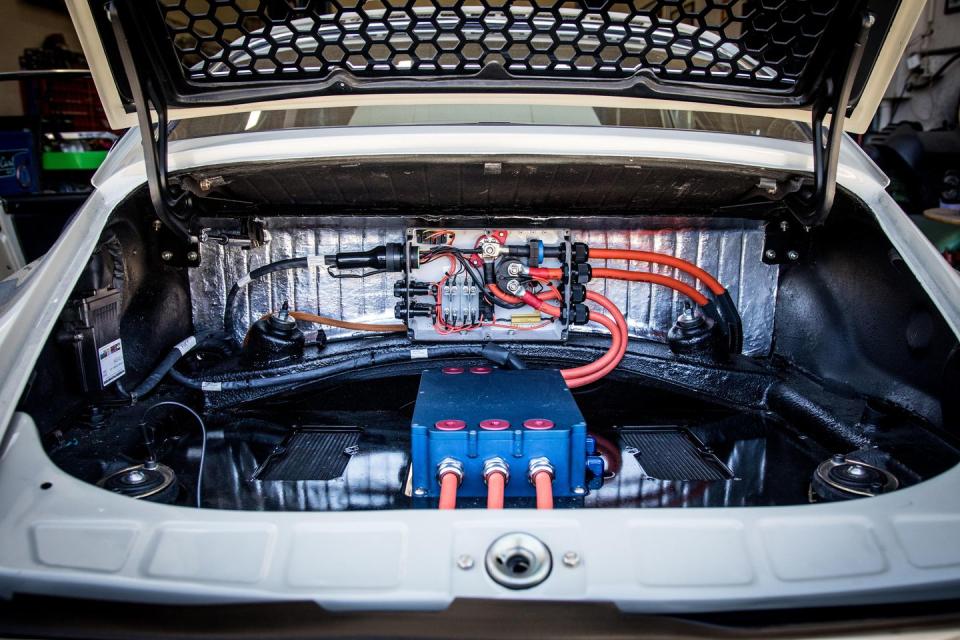
There's nothing wrong with the quiet competency of the Prius (the current styling, on the other hand, needs to dial down the Nyan Cat a tad). Bream's point is that even mundane modern cars are as quick as the sporty stuff of old. Putting new guts in an old shell creates the kind of hybrid that'll actually raise your pulse rate.
EV West's package includes regenerative braking and battery pack placement such that it can be swapped out in a few years as energy density improves. It's got all the everyday practicality of Toyota's appliance, but a sight more personality.
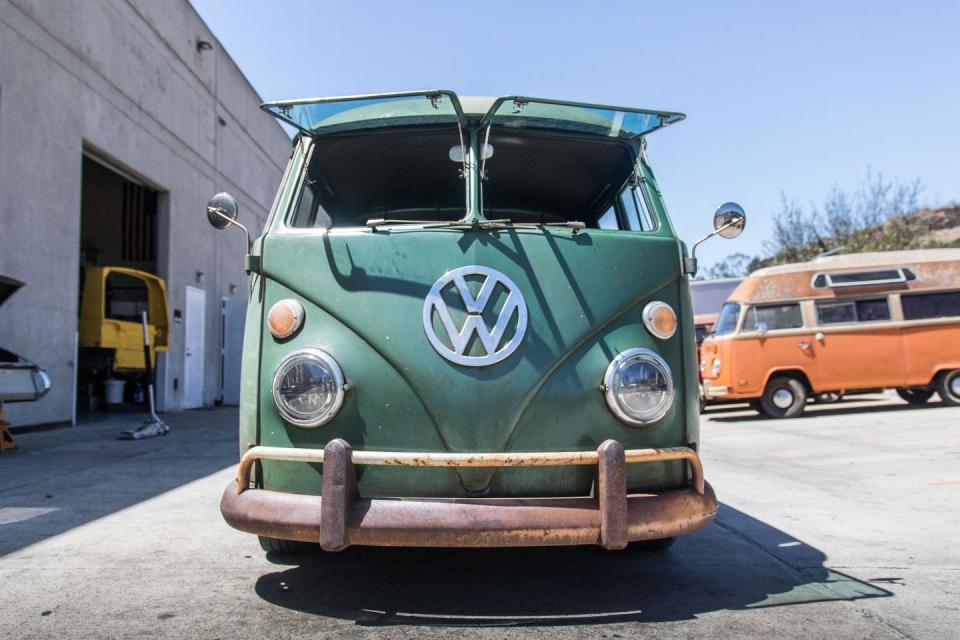
Consider Bream's daily driver, a split-window VW Doka with paint weathered like a lizard's skin and a slammed suspension. If you've never driven an old VW bus, they're usually glacially slow to get going, alarmingly ineffective at stopping, and just generally fun-but-slow. The EV West shop truck whirrs up to speed faster than a modern GTI, stops and corners easily, and will even hang the tail out a little if you jump on the throttle early. Best of all, the silence from the outside doesn't have onlookers frowning at your miscreant behavior. We hoon it around the block a bit without anyone complaining, then hit the secondary horn, a cheery ding-ding chime that makes a texting pedestrian look up from their phone and smile.
Then there's the driving experience of a manual-transmission electric vehicle. These things aren't go-karts, they're just cars that are harnessing a different mode of motive power. The instant-on surge of electric torque is addictive, but here it's combined with the ability to row through the gears. You can't stall it, and you can hold the car at a stop in first gear without having the clutch in, but aside from these weird (and handy) quirks, it's much like driving any of the tossable manual machines you might know and love.
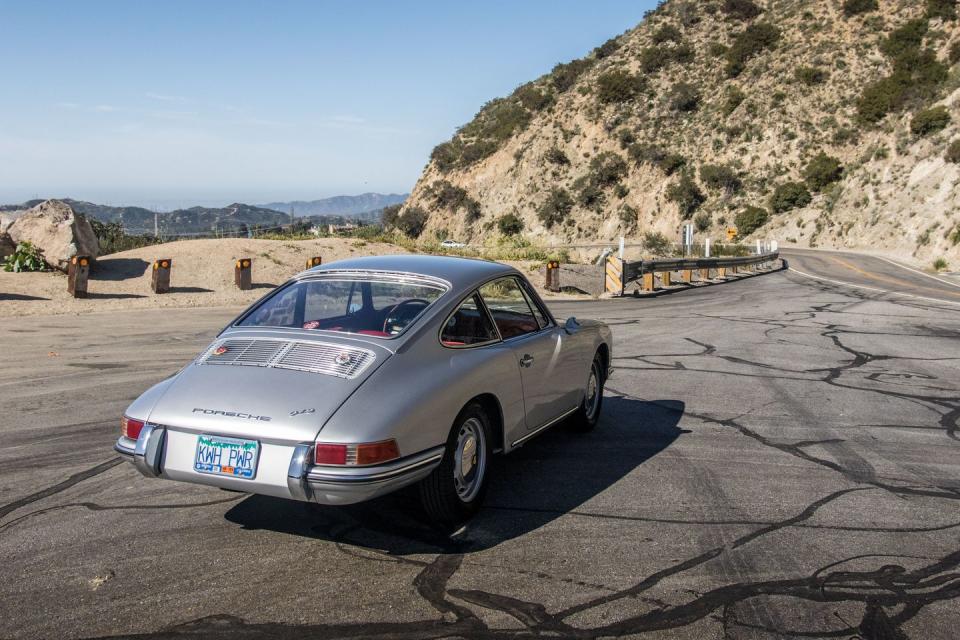
First misconception dismissed: a battery pack isn't a boat anchor for a classic. EV West works well within gross vehicle weight ratings (GVWR), and while they could physically build heavier machines with greater range, they're not looking to compromise the drive. Later, I drive an EV-swapped '66 Porsche 912 on the Angeles Crest highway, and despite it having three times the power of the four-cylinder original, it only weighs as much as a contemporary 911S with a full tank of gas.
Did the car drive like a classic Porsche? Not really – the front-mounted battery pack changes the weight distribution and eliminates the pendulum effect of the standard car's rear engine. As a result, the little 912 was as balanced as a modern MX-5, and just ridiculously quick. It hustled flat through the corners, with brakes you could lean on, and plenty of grunt to blast uphill. Then you get out at a pullout and look back at the machine and it's still 1966.
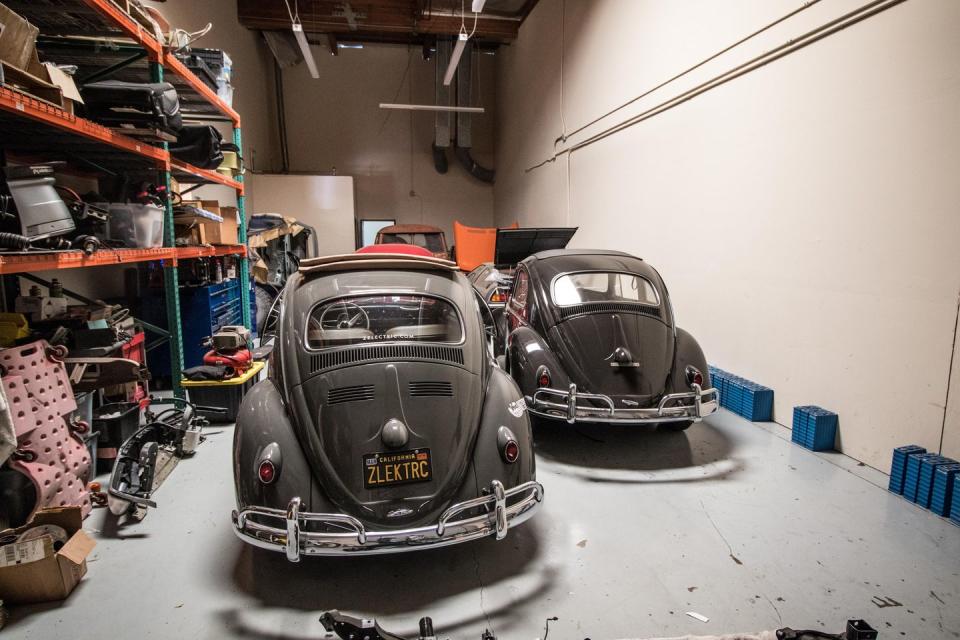
“We build these for the customer who says, 'I want new tech, but I don't want to sell my soul,'” Bream said.
Second misconception dismissed: the conversions aren't permanent. Bream and his team aren't looking to hack up bodywork, but to preserve the spirit of the original with more modern underpinnings. It's not much different than your standard resto-mod, just that it's Tesla power being used.
“Any of our builds, we could put it back to gasoline within about a day,” Bream said.
“Maybe half a day,” opined Trent Wonsley, a mechanical engineering grad with a background in off-road racing .

A known phenomenon in the Porsche community is for something like a numbers-matching 911 2.7RS to have its original engine pulled and set up on stands, and a tribute motor swapped in for better reliability and tractability. This is that same idea.
It makes perfect sense, but that's not the takeaway feeling you get from EV West. Instead, you clock the racing trophies on a shelf, see “Gigawatt” written on on the window of a dust-covered DeLorean in the back, note the EV-swapped Fiat 124 out front. Wonsley has a laptop hooked up to his personal-build 912, searching for controller issues; it looks like it should be flashing Danger To Manifold.
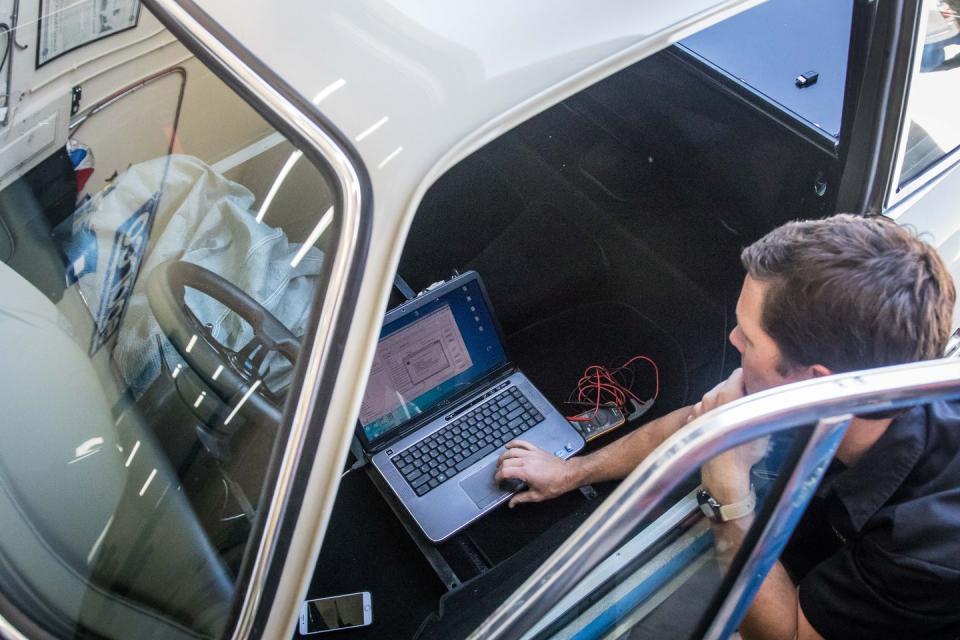
A guy with an electric Thing drops in, headed up to LA with plans to stop and surf. Bream fields calls, talks about his kid's new electric dirtbike, and shows me videos of a client's drag-car electric Cobra and a Factory 5 based kit car that runs a nine-second quarter mile. Dogs wander in and out at random. 3D printers whirr away creating cable connectors. A couple of techs are working on tweaks for the electric M3. One section of the shop is filled to the rafters with Tesla motors and batteries, lifted from salvaged cars and ready to be fitted to something about a thousand times better looking than a Model X.
This shop is speed first and EVs second. There's a care taken here that fits right into any gearhead ethos, a love for the cars, the desire to build, tinker, and create.
“Any real car guy doesn't care what his car runs on,” said Bream, “He just wants to be faster than the guy next to him.”
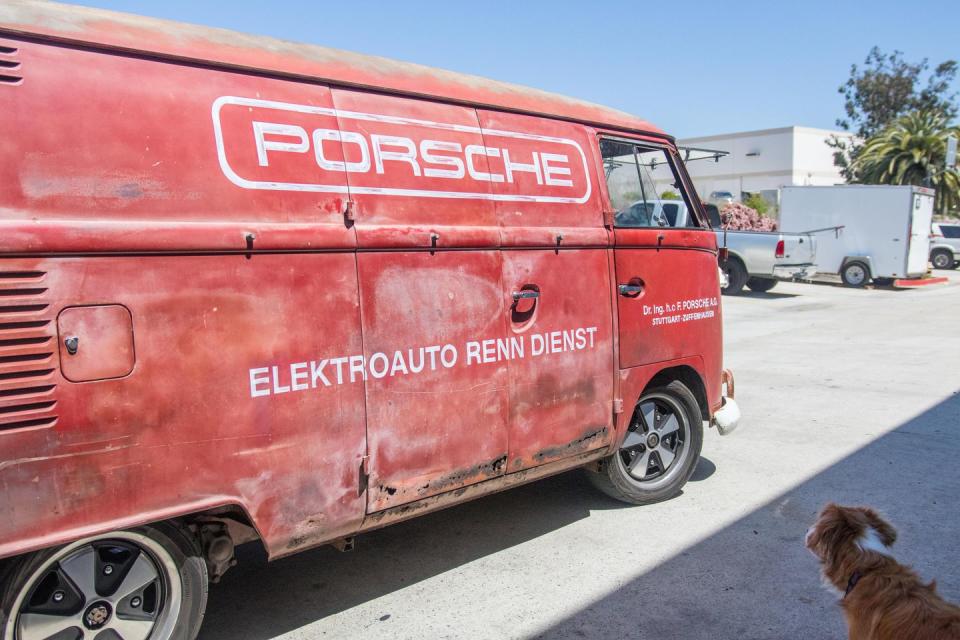
It's an ethos that appeals to gearheads who have the wherewithal to buy pretty much anything. Noted adventure motorcyclist and Anakin Skywalker surgeon Ewan McGregor recently brought his 1954 oval-window Beetle in for a full electrification. Once the swap's completed, he'll hold the higher ground against modern traffic. Someday, range won't be an issue for electric cars. The roads will probably be full of competent little electric crossovers that are quick and clean and about as boring as oatmeal.
It's a future that might look bleak to any enthusiast, but the work that's being done here ensures that something remains constant. Combustion is only temporary. Burnouts are forever.
You Might Also Like

 Yahoo Autos
Yahoo Autos 